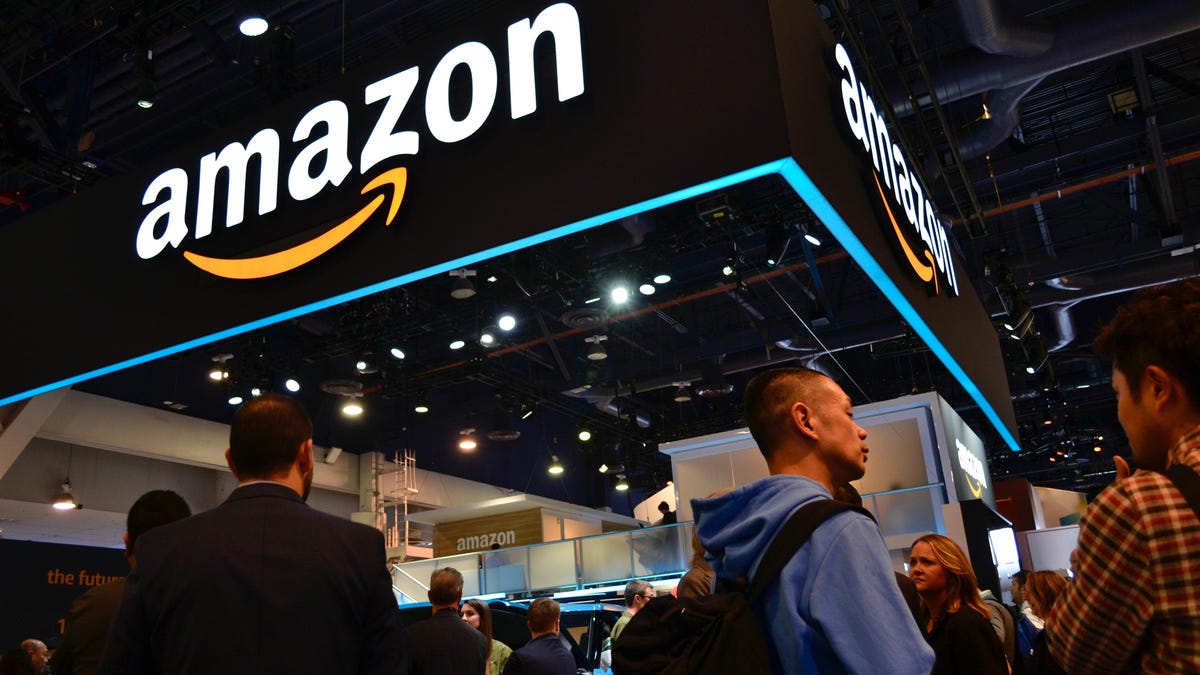 Why You Can Trust CNET
Why You Can Trust CNET Sonos, PopSockets speak out against Big Tech's dominance
In the US House of Representatives' latest antitrust hearing, smaller companies raise many concerns about Google, Amazon and Apple.

At an Amazon booth at the Las Vegas Convention Center during CES 2020 this month.
As David Barnett tells it, Amazon is an abusive, unfair and uncaring partner to smaller businesses using its platform.
Barnett, founder and CEO of PopSockets, which makes adhesive grips for the backs of phones, on Friday lambasted the e-commerce giant for ignoring issues about counterfeit that he'd raised for months and bullying him to lower his prices. His comments were part of his sworn testimony before the House Judiciary's Subcommittee on Antitrust, Commercial and Administrative Law, which has been holding hearings to investigate the potentially excessive power of the biggest tech companies in the US.
"This is tiring, this is tiring week after week," Barnett told lawmakers at the University of Colorado's Wittemyer Courtroom, describing Amazon's threats to extract better prices -- a practice that ultimately caused him to end his partnership selling products directly to Amazon.
He says his company is now banned from selling on Amazon's website on its own and he's lost countless sales after cutting off the lucrative direct-sales relationship. Other companies, he suggested, would rather put up with Amazon pushing them around to keep getting paid.
Amazon, along with fellow tech giants Facebook, Google and Apple, have all faced tough scrutiny over the past year from lawmakers and regulators, who not that long ago looked at Silicon Valley in a far more positive way. Now officials are raising concerns about these companies' growing dominance in the market, which could be squashing competition.
This work could bring about big changes in the tech industry, perhaps forcing big players to break up, cutting off future mergers, or creating new regulatory restrictions. Officials say they're pursuing this work to make sure innovative new startups can thrive and customers can benefit from strong competition.
These tech giants have defended themselves by saying they're small players in their broader fields, like Amazon being a tiny part of global retail. Facebook has pointed to emerging competition like TikTok threatening its lead in social media.
Regarding its PopSockets relationship, an Amazon spokesperson on Friday said it's continued to work with PopSockets on counterfeits even after the direct partnership ended, calling the company "a valued retail vendor." The person said Amazon does require some popular brands to sell directly to Amazon, so the company can ensure the best prices are available for customers.
Amazon also pointed to an IDC study, which Amazon funded and which was released Thursday, that discusses the sales growth of small- and medium-sized businesses on Amazon's platform.
This theme of imbalanced, dominating business relationships kept resurfacing during the hearing. As part of their relationship, Sonos CEO Patrick Spence told lawmakers, Google tried to restrict his company's innovations and wanted insights into Sonos' future product plans. Sonos this month sued Google, claiming the company stole its wireless speaker technology.
"There's such a dominant power that exists with these companies that really even as a company of our size you feel like you have no choice," Spence said.
A Google spokesperson responded: "Sonos has made misleading statements about our history of working together. Our technology and devices were designed independently. We deny their claims vigorously, and will be defending against them."
Kirsten Daru, general counsel at Tile, and David Heinemeier Hansson, chief technology officer of Basecamp, offered similar complaints that tech giants Apple and Google so thoroughly dominated their markets that it was virtually impossible not to work with them. Those companies then use that power to make unexpected and unfair changes that can harm smaller businesses, they said.
For instance, Hansson complained that Apple has been able to charge developers a 30% fee for paid apps for years because it faces little competition. Barnett, of PopSockets, said other online marketplaces that rival Amazon certainly exist, "but most of them are really tiny."
Fred Sainz, an Apple spokesman, said Friday that the company built its App Store as a safe, trusted place for customers, and a great business opportunity for developers.
Rep. David Cicilline, a Democrat from Rhode Island, who's chairman of the subcommittee, has already raised serious concerns about these companies' power, using terms like "economic nightmare" and "one algorithm tweak away from ruin" when talking about them on Friday.
Rep. Ken Buck, a Republican from Colorado, shared these concerns, showing there's bipartisan cooperation on this issue, but he warned against unnecessary government interventions.
For now the chance that any of these tech giants could get broken up is remote, and Wall Street has pushed all these companies' stocks higher despite this negative attention. Still, when Microsoft went through similar antitrust reviews 30 years ago, the process lasted for a decade, so it's anyone's guess what the outcome will be over such a long timeline.

